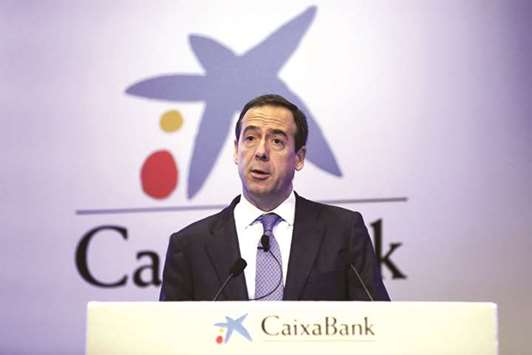Catalonia’s biggest bank warned a prolonged political conflict in the rebel region would inflict more wounds on the economy as separatists and the Spanish government prepared for their next showdown.
CaixaBank chief executive officer Gonzalo Gortazar said deposit withdrawals had been “moderate” since Catalonia’s unofficial referendum on independence on October 1 triggered Spain’s biggest political drama for almost four decades. The lender, whose profit almost doubled in the third quarter, has led an exodus of Catalan firms that have set up their legal bases outside the region to avoid the upheaval that would come from a split with Spain.
“I have full faith in our leaders that this issue will resolved soon, but it will start to have an impact if it drags on,” Gonzalo said after the bank reported earnings yesterday from Valencia rather than Barcelona. Customers stopped pulling money when the bank shifted its domicile and flows since have reversed, he said.
The next chapter in Catalonia’s secession battle will come this week with a Senate vote on Friday that likely will grant Prime Minister Mariano Rajoy the authority he’s seeking for his crackdown. The legislature in Barcelona, which is controlled by separatist parties, will convene on tomorrow and Friday with one key card left to play: a declaration of independence.
Catalonia’s separatists meanwhile are readying efforts to block Spain’s plan to seize their powers and oust them from office. Pro-independence activists are fine-tuning plans for a human shield to stop the Spanish authorities gaining access to regional government buildings as Spanish senators drawing up the proposal to approve the use of constitutional powers that include removing Catalan President Carles Puigdemont.
“The clash is still on,” said Antonio Barroso, an analyst in London at political risk adviser Teneo Intelligence. “The ball is in the court of the secessionist leadership and what happens next is down to the choices they make.”
Rajoy on Saturday announced plans to remove the separatist administration and take direct control of institutions including the regional police force and public media. Spain’s chief prosecutor said that any declaration by Puigdemont could mean he’d be accused of rebellion, a crime that entails immediate jail pending trial and possible sentence of up to 30 years. It remains to be seen if what’s unfolding this week is the denouement to the political theatre that has been gathering intensity for months.
Puigdemont claims the referendum result gives him a mandate to establish a Catalan republic. Rajoy says he has no choice but to wield the powers granted to him under Article 155 of Spain’s 1978 Constitution to restore legal order in Spain and that he wants to trigger elections in the region within six months. The constitution, written after the death of General Francisco Franco, forbids any region from seceding from Spain.
In the meantime, the focus is shifting to the issue of how Rajoy would be able to take the reins of power in Catalonia in the face of mass protests by the secessionists. Pro-independence groups have drawn up plans to protect the regional government’s headquarters in Barcelona’s Gothic quarter and the nearby parliament, according to two people familiar with their strategy.
“If it can’t avoid it in the coming days, Catalonia could be on its way towards a prolonged and intense dynamic of lack of control, legal insecurity and civic unease,” Cercle d’Economia, a business association, said in a statement. “Its consequences are unpredictable, but in any case dramatic in terms of self-government, coexistence, economic growth and employment.”
CaixaBank CEO Gortazar said movement toward a solution will create “instability” perhaps into the first quarter of next year, though not beyond that. Right now, there will be little effect on the bank’s forecast for a 2.7% increase in Spanish gross domestic product next year, he said.
“If the situation develops in a different way, obviously we will expect the impact on GDP will be a bit more than moderate,” he said.

u201cI have full faith in our leaders that this issue will resolved soon, but it will start to have an impact if it drags on,u201d CaixaBank CEO Gonzalo Gortazar said after the bank reported earnings yesterday from Valencia rather than Barcelona.
